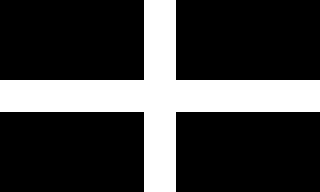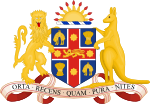
The coat of arms of Australia, officially called the Commonwealth Coat of Arms, is a formal symbol of the Commonwealth of Australia. It depicts a shield, containing symbols of Australia's six states, and is held up by native Australian animals, the kangaroo and the emu. The seven-pointed Commonwealth Star surmounting the crest also represents the states and territories, while golden wattle, the national floral emblem, appears below the shield.

The coat of arms of Victoria is the official heraldic symbol of the Australian state of Victoria. Victoria was the second state of Australia to gain arms, granted on 6 June 1910 by royal warrant of King George V. The state had been named in 1851 after his grandmother, who was in reign at the time. The final version of the arms was granted 28 March 1978 in the royal warrant issued by Queen Elizabeth II.

The Parliament of New South Wales is a bicameral legislature in the Australian state of New South Wales (NSW), consisting of the New South Wales Legislative Assembly and the New South Wales Legislative Council. Each house is directly elected by the people of New South Wales at elections held approximately every four years. The Parliament derives its authority from the King of Australia, King Charles III, represented by the Governor of New South Wales, who chairs the Executive Council. The parliament shares law making powers with the Australian Federal Parliament. The New South Wales Parliament follows Westminster parliamentary traditions of dress, Green–Red chamber colours and protocols.

The coat of arms of New South Wales is the official coat of arms of the Australian state of New South Wales. It was granted by royal warrant of King Edward VII dated 11 October 1906.
In Australia, state and territory colours are frequently part of a state or territory's set of state symbols.

Sillitoe tartan is the nickname given to the distinctive checkered pattern, usually black-and-white, which was originally associated with the police in Scotland. It later gained widespread use in the rest of the United Kingdom and overseas, notably in Australia and New Zealand, as well as Chicago and Pittsburgh in the United States. It is used occasionally elsewhere, including by some Spanish municipal police and in parts of Canada, where it is limited to auxiliary police services.
National symbols of Australia are the official symbols used to represent Australia as a nation or the Commonwealth Government. Additionally, each state and territory has its own set of symbols.
The symbols of Queensland represent the Australian state of Queensland and the Queensland Government. The different symbols and emblems represent both the state and the government. The official state emblems of Queensland are prescribed in the Emblems of Queensland Act 2005.
South Australia is one of Australia's states, and has established several state symbols and emblems.
Tasmania is one of Australia's states, and has established several state symbols and emblems.
Victoria is one of Australia's states, and has established several state symbols and emblems.
Western Australia is one of the states of Australia, and has established several state symbols and emblems.
The Australian Capital Territory is one of Australia's territories, and has established several territorial symbols and emblems.

Many different symbols are associated with Cornwall, a region which has disputed constitutional status within the United Kingdom . Saint Piran's Flag, a white cross on a black background is often seen in Cornwall. The Duchy of Cornwall shield of 15 gold bezants on a black field is also used. Because of these two symbols black, white and gold are considered colours symbolic of Cornwall.

Australian heraldry is the term for the style of armorial achievements, sometimes known as coats of arms, and other heraldic bearings and insignia used in Australia. It largely follows the Gallo-British tradition of heraldry also followed in England, Scotland, Ireland, Canada and New Zealand.

District tartans for the Commonwealth of Australia and for each of its constituent States have been registered in the Scottish Register of Tartans (SRT). Additionally, fashion tartans covering either Australia as a whole, or its capital city, Canberra, have been registered in the SRT, as have district tartans in respect of some of Australia's local government areas.













